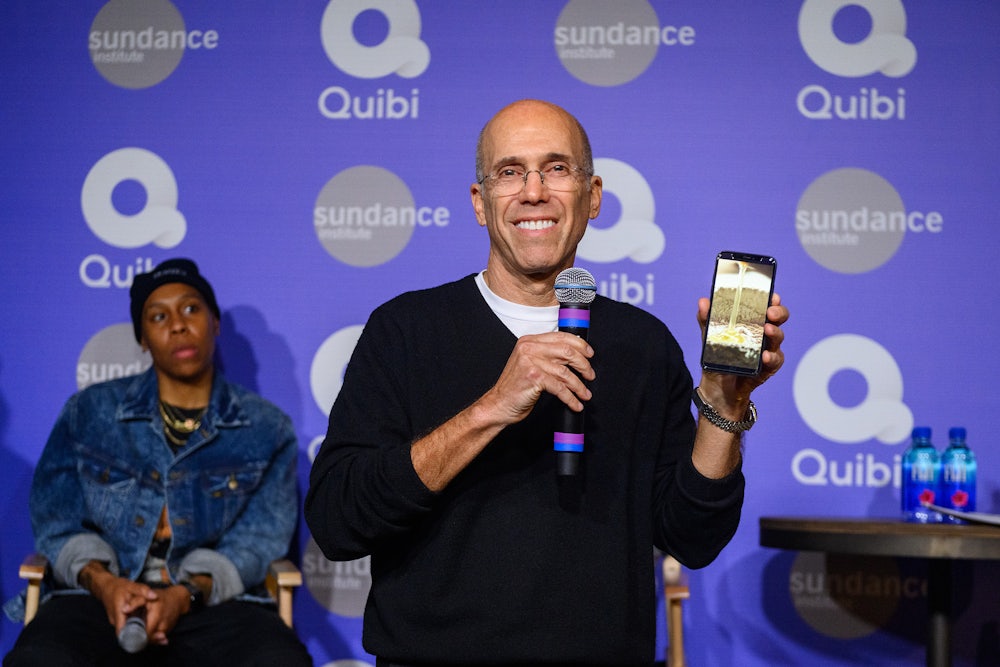Just about everything in the world is going wrong, but it’s been a golden age for streaming. With movie theaters, bookstores, and most forms of live entertainment on ice, we have little choice but to turn to our computers, phones, and streaming sticks. Tiger King and The Last Dance have become touchstones, dominating the cultural sphere in ways that probably would not have been possible in pre-coronavirus times. Netflix has emerged as a coronavirus-proof business, adding 16 million subscribers globally in the first quarter of this year.
If you wanted to launch another streaming service, this would appear to be a good time to do it. Audiences have never been more captive, and life has never been more monotonous. One can only watch an old YouTube video of, say, Kelsey Grammar falling off a stage so many times.
Quibi, the multibillion-dollar streaming service from former Disney honcho Jeffrey Katzenberg and failed Republican politician Meg Whitman, launched in early March, days before the country shut down. Fortuitous timing, you would think—but the launch has been a disaster. Despite offering a 90-day free trial, the service has already lost nearly two-thirds of its users. It claims to have one million active users, which, if true, is no small accomplishment (though millions fewer than other comparable newcomers). But that number remains a disappointment given its sizable seed capital of $1.8 billion.
Katzenberg has refused to accept responsibility for the debacle. “I attribute everything that has gone wrong to coronavirus,” Katzenberg told The New York Times. “Everything.” If Quibi’s budding failure is any indication, a good many harebrained schemes funded by venture capital will be blamed on the coronavirus instead of their out-of-touch creators and investors.
Quibi gets its name from a mashup of “quick” and “bites.” Its offerings, in other words, are short, about 15 minutes long. They are also star-studded, featuring Chrissy Teigen, The Rock, Reese Witherspoon, Jennifer Lopez, Idris Elba, LeBron James, and a host of other A-listers. Though essentially the same as normal TV (Teigen plays a judge, Chance the Rapper pranks celebrities), these shows were intended to fit into the fractured, ADD-ish way we allegedly consume content now.
Quibi is a pure product of VC logic. Katzenberg and Co. figured out that young people use their phones a lot, particularly while commuting. Quibi is an attempt to monetize the interstitial parts of the day, with the under-35 demographic paying $4.99 a month—that is, if Quibi can hold on to them for longer than 90 free days—to watch Nicole Richie try her hand at comedy or yet another adaptation of “The Most Dangerous Game.” The absence of these moments is what Katzenberg is blaming for his expensive platform’s rake-stepping start.
Some have blamed Quibi’s failure on its name, which is terrible in a way that is almost transcendent. But Netflix, it should be said, also has a dumb name. Quibi is certainly not helped by the fact that it is mobile-only at a time when most of us are stuck at home with access to larger screens. Still, Quibi’s problems run much deeper.
For one, people are not starved for content on their commute. Podcasts, most of which are longer than 20 minutes, are exceedingly popular. It is also possible to watch television on the subway and simply pause it when you have to get out at your stop. And while this may come as a shock to the older members of the chattering classes, there isn’t anything wrong with the attention spans of millennials specifically. Friends, the most traditional of traditional sitcoms, has proven to be exceedingly popular among that demographic.
Younger people aren’t looking for shorter content. They’re struggling with a glut of content of all kinds. Quibi entered an already saturated marketplace and had to compete with platforms like Netflix, Disney+, and HBO—all of which feature content that is already popular. Quibi is differentiated not by its originality but its cynicism—its ruthless pursuit of one of the few parts of our lives that aren’t spent at home or at work.
That Katzenberg is blaming everything on a pandemic is not surprising. There are plenty of businesses that are failing because of the coronavirus. Three percent of restaurants have already closed down permanently. Millions are unemployed. Those businesses have a legitimate gripe and are in desperate need of help. But Quibi’s problem isn’t the coronavirus. It’s Quibi.
